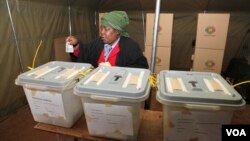Zimbabwe’s presidential race tightened between early May and early July as incumbent Emmerson Mnangagwa’s lead over challenger Nelson Chamisa dropped from 11 to just 3 percentage points among registered likely voters, a new survey shows.
Findings of the nationally representative survey, which the Mass Public Opinion Institute (MPOI) conducted in all 10 provinces of Zimbabwe between 25 June and 6 July 2018, suggest that the MDC-T Chamisa/Alliance has benefited from a small increase in party identification and perceptions of Chamisa as the more capable candidate to address voters’ top priority: job creation.
According to Afrobarometer, compared to a pre-election baseline survey in April/May, the new findings point toward a close election outcome denying the winner a broad electoral mandate, and confirm majority support for a Government of National Unity (GNU).
“As for who was ahead in the presidential race, Mnangagwa’s 11-percentage-point lead in early May (42% vs. 31% for Chamisa) dropped to just 3 points as of early July: 40% of registered likely voters said they would vote for the incumbent vs. 37% for the challenger. It is important to remember that an uncertainty factor of +/-2 percentage points surrounds these figures and that the voting intentions of 20% of registered likely voters remained unknown.
“When asked which candidate they think will win the election, 43% of all respondents picked Mnangagwa, while 34% said Chamisa.”
Afrobarometer says Chamisa outranked Mnangagwa, 42% to 32%, in popular perceptions of which candidate would “do a better job in creating jobs for the people” – by far Zimbabweans’ most important campaign issue.
Six in 10 Zimbabweans said that if no presidential candidate achieves a clear victory, they would favour the creation of a Government of National Unity (GNU). The proportion who thought that a GNU was likely increased from 33% in early May to 41% in early July.
There are 23 presidential candidates in the forthcoming election featuring front runners.




